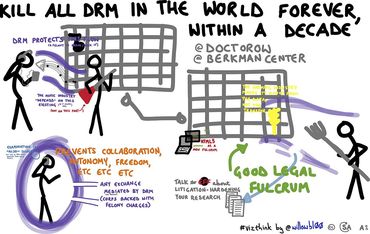The Rochdale hypothesis
-thumb-270x360-798.jpg) First, open a shop. Thus the pioneers of Rochdale, Lancashire, began the process of building their town. Faced with the jobs and loss of income brought by the Industrial Revolution, a group of 28 people, about half of them weavers, designed the set of Rochdale principles, and set about finding £1 each to create a cooperative that sold a few basics. Ten years later, Wikipedia tells us, Britain was home to thousands of imitators: cooperatives became a movement.
First, open a shop. Thus the pioneers of Rochdale, Lancashire, began the process of building their town. Faced with the jobs and loss of income brought by the Industrial Revolution, a group of 28 people, about half of them weavers, designed the set of Rochdale principles, and set about finding £1 each to create a cooperative that sold a few basics. Ten years later, Wikipedia tells us, Britain was home to thousands of imitators: cooperatives became a movement.
Could Rochdale form the template for building a public service internet?
This was the endpoint of a day-long discussion held as part of MozFest and led by a rogue band from the BBC. Not bad, considering that it took us half the day to arrive at three key questions: What is public? What is service? What is internet?
Pause.
To some extent, the question's phrasing derives from the BBC's remit as a public service broadcaster. "Public service" is the BBC's actual mandate; broadcasting the activity it's usually identified with, is only the means by which it fulfills that mission. There might be - are - other choices. To educate, inform, to entertain, those are its mandate. Neither says radio or TV.
Probably most of the BBC's many global admirers don't realize how broadly the BBC has interpreted that. In the 1980s, it commissioned a computer - the Acorn, which spawned ARM, whose chips today power smartphones - and a series of TV programs to teach the nation about computing. In the early 1990s, it created a dial-up Internet Service Provider to help people get online. Some ten or 15 years ago I contributed to an online guide to the web for an audience with little computer literacy. This kind of thing goes way beyond what most people - for example, Americans - mean by "public broadcasting".
But, as Bill Thompson explained in kicking things off, although 98% of the public has some exposure to the BBC every week, the way people watch TV is changing. Two days later, the Guardian reported that the broadcasting regulator, Ofcom, believes the BBC is facing an "existential crisis" because the younger generation watches significantly less television. An eighth of young people "consume no BBC content" in any given week. When everyone can access the best of TV's back catalogue on a growing array of streaming services, and technology giants like Netflix and Amazon are spending billions to achieve worldwide dominance, the BBC must change to find new relevance.
So: the public service Internet might be a solution. Not, as Thompson went on to say, the Internet to make broadcasting better, but the Internet to make *society* better. Few other organizations in the world could adopt such a mission, but it would fit the BBC's particular history.
Few of us are happy with the Internet as it is today. Mozilla's 2018 Internet Health Report catalogues problems: walled gardens, constant surveillance to exploit us by analyzing our data, widespread insecurity, and increasing censorship.
So, again: what does a public service Internet look like? What do people need? How do you avoid the same outcome?
"Code is law," said Thompson, citing Lawrence Lessig's first book. Most people learned from that book that software architecture could determine human behaviour. He took a different lesson: "We built the network, and we can change it. It's just a piece of engineering."
Language, someone said, has its limits when you're moving from rhetoric to tangible service. Canada, they said, renamed the Internet "basic service" - but it changed nothing. "It's still concentrated and expensive."
Also: how far down the stack do we go? Do we rewrite TCP/IP? Throw out the web? Or start from outside and try to blow up capitalism? Who decides?
At this point an important question surfaced: who isn't in the room? (All but about 30 of the world's population, but don't get snippy.) Last week, the Guardian reported that the growth of Internet access is slowing - a lot. UN data to be published next month by the Web Foundation, shows growth dropped from 19% in 2007 to less than 6% in 2017. The report estimates that it will be 2019, two years later than expected, before half the world is online, and large numbers may never get affordable access. Most of the 3.8 billion unconnected are rural poor, largely women, and they are increasingly marginalized.
The Guardian notes that many see no point in access. There's your possible starting point. What would make the Internet valuable to them? What can we help them build that will benefit them and their communities?
Last week, the New York Times suggested that conflicting regulations and norms are dividing the Internet into three: Chinese, European, and American. They're thinking small. Reversing the Internet's increasing concentration and centralization can't be by blowing up the center because it will fight back. But decentralizing by building cooperatively at the edges...that is a perfectly possible future consonant with its past, even we can't really force clumps of hipsters to build infrastructure in former industrial towns, by luring them there with cheap housing prices. Cue Thompson again: he thought of this before, and he can prove it: here's his 2000 manifesto on e-mutualism.
Building public networks in the many parts of Britain where access is a struggle...that sounds like a public service remit to me.
Illustrations: Illustrations: The Unity sculpture, commemorating the 150th anniversary of the Rochdale Pioneers (via Wikimedia.
Wendy M. Grossman is the 2013 winner of the Enigma Award. Her Web site has an extensive archive of her books, articles, and music, and an archive of earlier columns in this series. Stories about the border wars between cyberspace and real life are posted occasionally during the week at the net.wars Pinboard - or follow on Twitter.


